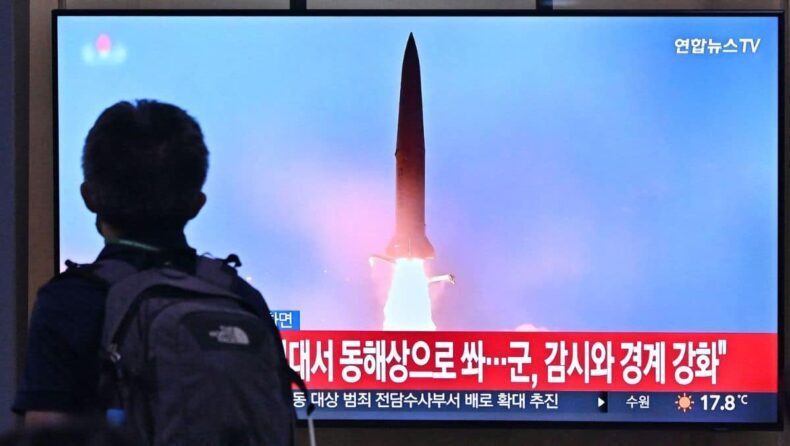The Korean peninsula is seeing increasing tensions as the North Korean regime continues to launch ballistic missiles with increasing long ranges, causing worry among South Korea, Japan, the United States, and now other regional powers as well, including India.
On Wednesday, at the meeting of the UN Security Council, India joined other nations—the US, South Korea, Japan, the UK, France, and others—in condemning the launch of ballistic missiles by North Korea.
Ruchira Kamboj, India’s Permanent Representative to the UN Ambassador, said at the meeting that India has “noted with concern the reports of ballistic missile launches” by the DPRK (Democratic People’s Republic of Korea).
The DPRK is the official name of North Korea, while the Republic of Korea is the official name of South Korea.
The international community, with the exception of China and Russia, has been increasingly vocal against North Korea’s continued arms accumulation and testing of ballistic weapons.

North Korea launched its 24th missile test of the year on Tuesday, during which a ballistic missile sailed over Japan for the first time in five years.
This is the longest-ever weapons test conducted by North Korea with ballistic missiles capable of carrying nuclear warheads with the potential to reach the United States territory of Guam in the Pacific Ocean.
India’s remarks on North Korea’s launch of ballistic missile
Ruchira Kamboj, India’s Permanent Representative, further reiterated that such launches by North Korea “affect the peace and security of the region and beyond” and “violate Security Council resolutions relating to the DPRK.”
India advocated for the proper realization of the pertinent DPRK-related UN Security Council resolutions and “reiterated the necessity of combating the spread of DPRK-related nuclear and missile technologies in the region.”

India also stated that the continuation of the “current geopolitical environment and associated problems” had a negative impact on the peace and security in the area, including India’s own. “Therefore, it is crucial to keep working diligently to uphold peace and stability.”
Ruchira Kamboj emphasized India’s strong commitment to denuclearization in the speech in order to maintain peace and security on the Korean peninsula.
According to Kamboj, India will “continue to promote dialogue and diplomacy as methods of resolving problems in the Korean Peninsula,” citing a “common interest.”
Joint statement at the UNSC
At the UN Security Council meeting on North Korea’s ballistic missile launches, the United States Ambassador to the UN, Linda Thomas-Greenfield, issued a joint statement on behalf of Albania, Brazil, France, India, Ireland, Japan, Norway, South Korea, the United Arab Emirates, the United Kingdom, and the United States.
Linda Thomas-Greenfield spoke on behalf of the 11 countries, stating that they “strongly condemn the DPRK’s long-range ballistic missile launch, which flew over Japan” on October 4 and its seven additional ballistic missile launches since September 25. She also noted that North Korea has now launched more than 35 ballistic missiles this year alone.

The continued acceleration in North Korea’s nuclear and ballistic missile programs has signaled to the world that North Korea and its leader have no intention of slowing down.
The joint statement appealed to the other UN member nations to also condemn such “reckless behavior” and push North Korea to abandon “its unlawful weapons programs and engage in diplomacy toward denuclearisation.”
The escalation in missile launches by North Korea was last seen in 2017 when the UN Security Council took unanimous action to hold North Korea accountable for its unlawful actions.
Appealing to the UN Security Council, the statement said that the time has come to unify once again as “the DPRK is testing the Council’s resolve” and that to find a viable solution, the council must work together.
Continuity in tensions on the Korean Peninsula
According to analysts, North Korea has conducted missile tests this year from a variety of sites and launchers in an effort to replicate a crisis and make it difficult for enemies to find and neutralize the missiles.
The testing of long-range weapons by North Korea has raised security concerns for many countries, as North Korea continues to test ballistic missiles capable of carrying nuclear warheads, defying international law and maritime security.
Tensions on the Korean Peninsula remain high following the launch of 30 military planes by South Korea in response to North Korea conducting air-to-surface firing drills near their shared borders.
The increasing tensions on the peninsula with nuclear weapons are detrimental to international peace and security as any point of friction can lead to full-scale direct conflict between the countries.
Thus, it is imperative for the international community to come together to resolve the issue at the earliest, as the world is already dealing with violent conflicts and the aftereffects of the pandemic, and adding another violent conflict might lead to major consequences.













